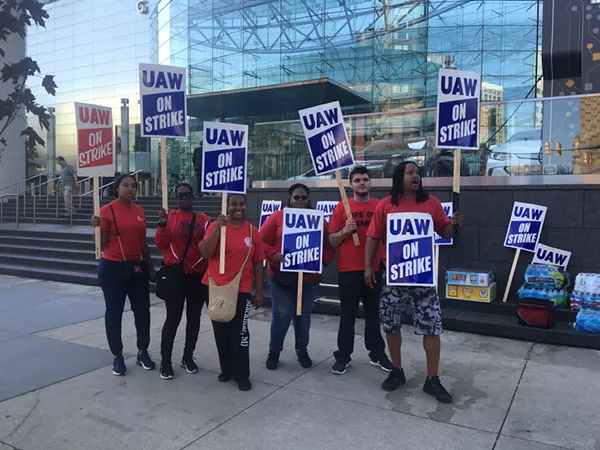
Lee DeVito
GM workers on strike outside of GM's Detroit headquarters.
As of Wednesday, the United Auto Workers' strike of General Motors that started Monday became the union's longest in more than a decade. And there's no end in sight, as negotiations have reportedly made no progress so far.
Experts are already warning that the loss of production — one analysis estimates the strikes could cost the automaker a loss of 43,500 vehicles by the end of the week — could have a massive effect on Michigan's economy. Recent headlines by The Detroit News and Crain's Detroit Business warn that a strike lasting longer than about 10 days could send Michigan back into a single-state recession for the first time since 2010.
One expert told The Detroit News that a work stoppage of more than a month or two could have "national implications," though he said he believes that is unlikely, given the UAW's paltry $250 a week strike fund for the 46,000 workers — which is less than minimum wage. Another analyst told Crain's that a prolonged strike would be "a serious miscalculation by the UAW that could have repercussions for years." The New York Times warns that a prolonged stoppage could affect GM's Canadian and Mexican operations, "crimping the company’s bottom line and the fortunes of its parts suppliers."
The thing is, blaming an impending recession on the striking GM workers is unfair. It's not zooming out far enough. It's mistaking the effect for the cause, or the symptom for the disease.
Among other things, GM UAW workers are fighting for restored wages. After GM's bankruptcy and federal bailout in 2009, the UAW agreed to concessions including a lower tier of wages for new employees, even though they are doing the same job as workers hired at the initial rate. The UAW workers believe that their sacrifice helped save GM, and they're not wrong: GM posted record profits for the past decade. However, the company never restored the workers' wages, and worse, it hires "temporary" employees with reduced benefits, offering them no clear path to permanent status. Some employees have been "temporary" for years.
Suffice it to say, that's not right.
And even before the strike started, there were plenty of warning signs that a recession would soon hit Michigan. A report by LendingTree released last week ranked Michigan as the state having the highest probability for the r-word.
"At 58.86%, the chance that Michigan will have weak economic fundamentals in the fourth quarter is the highest in the nation," the report noted. "In fact, Michigan’s state coincident index’s growth rate was negative in July (the last month available at the time of this piece’s writing), all but confirming that its economy is on shaky grounds."
Another report from Michigan Radio from last month said the Great Lakes State could already be in the early stage of a recession, citing the fact that there has been essentially no job growth during the first half of this year.
Plus, there are other warning signs that shit is about to hit the fan. There's the fact that the U.S. economy has been growing for more than a decade, and is on track to become the longest economic expansion in more than a century. In August, the bond market experienced a so-called "inverted yield curve," where yields on two-year Treasury bonds were higher than those on 10-year ones, a phenomenon that is widely viewed as a harbinger of an imminent recession. (The last time it happened was June 2007, just before the Great Recession, and it also happened just before the last two recessions before that.)
And let's not forget that so-called "skyscraper curse," an economic theory that the construction of tallest buildings is typically a signal of an overheated economy on the verge of a downturn. Dan Gilbert's Hudson's site project is supposed to be the tallest building in Michigan.
GM has enough inventory to last more than 70 days, according to a recent report from Cox Automotive. Aside from the short strike in 2007, the last major strike against GM was in 1970, which lasted 67 days.
Stay on top of Detroit news and views. Sign up for our weekly issue newsletter delivered each Wednesday.







